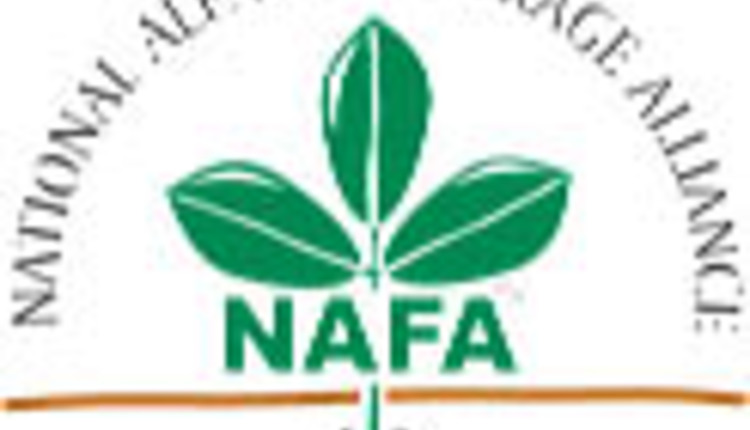This item has been supplied by a forage marketer and has not been edited, verified or endorsed by Hay & Forage Grower.
Please be aware of the short turnaround on this opportunity:Applications must be received by 5:00 p.m. (Mountain time), Monday, January 11, 2016.

Alfalfa Pollinator Research Initiative: Requests for Plans
Funding available through the Alfalfa Pollinator Research Initiative (APRI) provides valuable resources from USDA Agricultural Research Service for research that ensures the availability of healthy non-Apis pollinator populations essential for alfalfa seed production. The current primary non-Apis (non-honey bee) pollinators are the alfalfa leafcutting bee, Megachile rotundata, and the alkali bee, Nomia melanderi.
Research must address one or more of the topics listed, which are all relevant to alfalfa pollinators:
1. Management: Includes assessment of current, and the development of new, methods for storing and rearing bees at bee-management facilities or on the farm, including better understanding of bee development under natural and artificial conditions.
2. Production: Includes development of practices for cost-effective on-farm and off-farm multiplication and retention of populations for commercial use.
3. Safety: Includes studies of the effects on alfalfa-pollinating bees: 1) of exposure to pesticides (used for crop or for bees), 2) of farming/community practices (e.g., tilling, pesticide-treated seed plantings, weed control, mosquito abatement), and 3) of bee handling and shipping.
4. Epidemiology and Disease Management: Includes study of bee-related pathogens, predators, parasites, and their interactions with other natural factors (e.g., nutrition, starvation, pesticides) that contribute directly or indirectly to mortality or reduced fecundity.
5. Genetics and Demographics: As directly relevant to the above topics, includes studies of bee population genetics, gene expression, and demographics such as population presence, abundance, and distribution (historical and present).
Requests for plans (RFPs) of work for Fiscal Year 2016 will be accepted until January 11, 2016. Funding requests may be for work requiring up to two years for completion, but cannot exceed $25,000 per year and can only be funded one year at a time. For two-year plans, please submit separate budget sheets for each year, neither exceeding $25,000. Funding consideration, however, will only be given for Year 1 during this requesting cycle.
At this time also, a request for Year 2 of a plan already funded for Year 1 should be (re)submitted, with only the Year 2 budget.
Contingent on the number of awarded proposals, full budget requests may, or may not, be met. It is strongly encouraged that findings be reported in peer-reviewed journals. Additionally, brief project reports (1-3 pages) will be solicited and required annually and will be posted on a website, which will archive all APRI projects in a searchable database. By solicitation of the program organizer, oral reports or posters by funded researchers may be requested for presentation at the annual Western Alfalfa Seed Growers Association meeting in January.
RFPs are accepted for review only if they strictly adhere to submission procedures and format outlined below. Only RFPs received by close of business (5 pm Mountain Time) on the given deadline will be accepted for review.
RFPs will be reviewed by ARS Pollinating Insects Research Unit scientists and the six Class 1 members of the National Alfalfa & Forage Alliance. Announcements of awarded proposals for 2016 will be made by February 5. Funding will be provided to non-ARS PIs via Specific Cooperative Agreements between ARS and the institution of the Lead Investigator. ARS PIs will be funded at the ARS Research Unit level. The dispensation of funds will occur as efficiently as is possible within any current restrictions on the Federal Budget or the work load of the ARS agreement specialists.
For more information contact:
Theresa Pitts-Singer, USDA-ARS
Phone: (435) 797-0581
Email:Theresa.Pitts-Singer@ars.usda.gov
At this time also, a request for Year 2 of a plan already funded for Year 1 should be (re)submitted, with only the Year 2 budget.
Contingent on the number of awarded proposals, full budget requests may, or may not, be met. It is strongly encouraged that findings be reported in peer-reviewed journals. Additionally, brief project reports (1-3 pages) will be solicited and required annually and will be posted on a website, which will archive all APRI projects in a searchable database. By solicitation of the program organizer, oral reports or posters by funded researchers may be requested for presentation at the annual Western Alfalfa Seed Growers Association meeting in January.
RFPs are accepted for review only if they strictly adhere to submission procedures and format outlined below. Only RFPs received by close of business (5 pm Mountain Time) on the given deadline will be accepted for review.
RFPs will be reviewed by ARS Pollinating Insects Research Unit scientists and the six Class 1 members of the National Alfalfa & Forage Alliance. Announcements of awarded proposals for 2016 will be made by February 5. Funding will be provided to non-ARS PIs via Specific Cooperative Agreements between ARS and the institution of the Lead Investigator. ARS PIs will be funded at the ARS Research Unit level. The dispensation of funds will occur as efficiently as is possible within any current restrictions on the Federal Budget or the work load of the ARS agreement specialists.
For more information contact:
Theresa Pitts-Singer, USDA-ARS
Phone: (435) 797-0581
Email:Theresa.Pitts-Singer@ars.usda.gov

